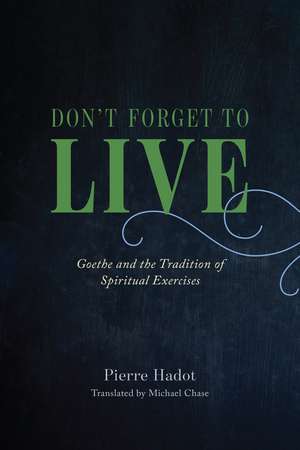Don't Forget to Live: Goethe and the Tradition of Spiritual Exercises: The France Chicago Collection
Autor Pierre Hadot Traducere de Michael Chase Cuvânt înainte de Arnold I. Davidson, Daniele Lorenzinien Limba Engleză Hardback – 5 apr 2023
With a foreword by Arnold I. Davidson and Daniele Lorenzini.
In his final book, renowned philosopher Pierre Hadot explores Goethe’s relationship with ancient spiritual exercises—transformative acts of intellect, imagination, or will. Goethe sought both an intense experience of the present moment as well as a kind of cosmic consciousness, both of which are rooted in ancient philosophical practices. These practices shaped Goethe’s audacious contrast to the traditional maxim memento mori (Don’t forget that you will die) with the aim of transforming our ordinary consciousness. Ultimately, Hadot reveals how Goethe cultivated a deep love for life that brings to the forefront a new maxim: Don’t forget to live.
Preț: 157.25 lei
Nou
Puncte Express: 236
Preț estimativ în valută:
30.09€ • 31.50$ • 24.90£
30.09€ • 31.50$ • 24.90£
Carte disponibilă
Livrare economică 17-31 martie
Livrare express 28 februarie-06 martie pentru 31.28 lei
Preluare comenzi: 021 569.72.76
Specificații
ISBN-13: 9780226497167
ISBN-10: 022649716X
Pagini: 200
Ilustrații: 7 halftones
Dimensiuni: 140 x 216 x 15 mm
Greutate: 0.52 kg
Ediția:First Edition
Editura: University of Chicago Press
Colecția University of Chicago Press
Seria The France Chicago Collection
ISBN-10: 022649716X
Pagini: 200
Ilustrații: 7 halftones
Dimensiuni: 140 x 216 x 15 mm
Greutate: 0.52 kg
Ediția:First Edition
Editura: University of Chicago Press
Colecția University of Chicago Press
Seria The France Chicago Collection
Notă biografică
Pierre Hadot (1922–2010) was professor of the history of Hellenistic and Roman thought at the Collège de France. He was the author of many books, including Plotinus, or The Simplicity of Vision. Michael Chase is a senior researcher at the Centre National de la Recherche Scientifique–Centre Jean Pépin and adjunct professor of Greek and Roman studies at the University of Victoria. Arnold I. Davidson is Distinguished Professor of Humanities at the Hebrew University of Jerusalem as well as the Robert O. Anderson Distinguished Service Professor Emeritus at the University of Chicago. Daniele Lorenzini is associate professor of philosophy at the University of Pennsylvania.
Cuprins
Translator’s Introduction
Preface
1. “The Present Is the Only Goddess I Adore”
Faust and Helen
The Present, the Trivial, and the Ideal
Idyllic Arcadia
Unconscious Health or Conquered Serenity?
The Philosophical Experience of the Present
The Tradition of Ancient Philosophy in Goethe
The Present, the Instant, and Being-There in Goethe
2. The View from Above and the Cosmic Journey
The Instant and the View from Above
The View from Above in Antiquity: Peaks and Flight of the Imagination
The Philosophical Meaning of the View from Above among Ancient Philosophers
The Medieval and Modern Tradition
The Various Forms of the View from Above in Goethe
The View from Above after Goethe
Aeronauts and Cosmonauts
3. The Wings of Hope: The Urworte
Daimôn, Tukhê
Daimôn, Tukhê, Eros, Anankê, and Elpis
Human Destiny
Autobiographical Aspects?
The Caduceus
Elpis, Hope
4. The Yes to Life and the World
Great Is the Joy of Being-There (Freude des Daseins)
Greater Still Is the Joy One Feels in Existence Itself (Freude am Dasein)
The Yes to Becoming and the Terrifying
Goethe and Nietzsche
Conclusion
Translator’s Note
Notes
Bibliography
Index
Preface
1. “The Present Is the Only Goddess I Adore”
Faust and Helen
The Present, the Trivial, and the Ideal
Idyllic Arcadia
Unconscious Health or Conquered Serenity?
The Philosophical Experience of the Present
The Tradition of Ancient Philosophy in Goethe
The Present, the Instant, and Being-There in Goethe
2. The View from Above and the Cosmic Journey
The Instant and the View from Above
The View from Above in Antiquity: Peaks and Flight of the Imagination
The Philosophical Meaning of the View from Above among Ancient Philosophers
The Medieval and Modern Tradition
The Various Forms of the View from Above in Goethe
The View from Above after Goethe
Aeronauts and Cosmonauts
3. The Wings of Hope: The Urworte
Daimôn, Tukhê
Daimôn, Tukhê, Eros, Anankê, and Elpis
Human Destiny
Autobiographical Aspects?
The Caduceus
Elpis, Hope
4. The Yes to Life and the World
Great Is the Joy of Being-There (Freude des Daseins)
Greater Still Is the Joy One Feels in Existence Itself (Freude am Dasein)
The Yes to Becoming and the Terrifying
Goethe and Nietzsche
Conclusion
Translator’s Note
Notes
Bibliography
Index
Recenzii
"There are few figures in Western literature whose legacies are as bound up with their work as Goethe, and Hadot’s powerful interpretation is undoubtedly an important milestone in that legacy’s history. Even apart from it many other virtues, that reason alone makes this volume a necessary addition to the libraries of Goethe scholars."
“To read Pierre Hadot sparks enormous joy.”
“No one is more qualified to describe this spiritual line of descent than Pierre Hadot”
“A very beautiful book that celebrates action, the duty to serve, and joy.”
“This deeply personal work, by one of the greatest of French classical philosophers, featuring one of his major inspirations, the great German author and philosopher Goethe, excellently translated by Michael Chase, might just change your life. It is the culmination of Hadot’s long-term concern with ‘philosophy as a way of life,’ and constitutes a significant expansion and deepening of this theme.”
“Renowned for reviving the classical idea of philosophy as an art of living, Pierre Hadot combines his expertise in Greco-Roman thought with an extensive study of Goethe to produce a fascinating book, rich in both erudition and relevance for the conduct of life—reinterpreting, with compelling nuance and philosophical sophistication, the deeper, more mindful meaning of the Horatian maxim carpe diem. What you learn from this book can change your life.”
"Pointing to similarities to the ancient philosophers Goethe knew intimately, Hadot observes that Goethe owes a debt to them but surpasses them in his emphasis on remembering to live a joyfully fulfilling life. Beautifully translated."


